 Technology peripherals
Technology peripherals
 AI
AI
 Earning 2,000 stars, the speed is increased by a hundred times, and the high-performance Python compiler Codon is open source
Earning 2,000 stars, the speed is increased by a hundred times, and the high-performance Python compiler Codon is open source
Earning 2,000 stars, the speed is increased by a hundred times, and the high-performance Python compiler Codon is open source
As we all know, Python is a programming language that is easy to learn and has powerful functions. It always ranks at the top of various user usage statistics lists. Accordingly, researchers have developed various convenient tools around Python to better serve this language.
The compiler acts as a translator between high-level languages and machines. Different versions of Python compilers have been developed. Below we will introduce a new high-performance Python to you. Compiler: Codon. The project has been online for just a few days and has already received 2.2k stars.
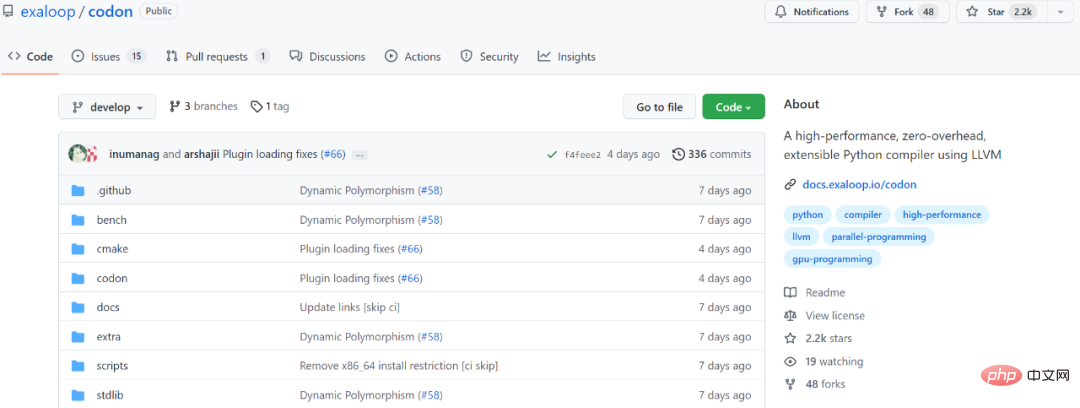
## Project address: https://github.com/exaloop/codon
As a high-performance Python compiler, Codon compiles Python code into native machine code without any runtime overhead. Typical speedups for Python are around 10-100x or more on a single thread. Codon's performance is generally comparable to C/C's. Unlike Python, Codon supports native multi-threading, which can make it many times faster. Codon is extensible through a plugin infrastructure, which allows users to incorporate new libraries, compiler optimizations and even keywords.
The Codon framework is fully modular and extensible, allowing seamless integration of new modules, compiler optimizations, domain-specific languages, and more, and is actively serving many applications such as bioinformatics and quantitative finance. Develop new Codon extensions in various areas.
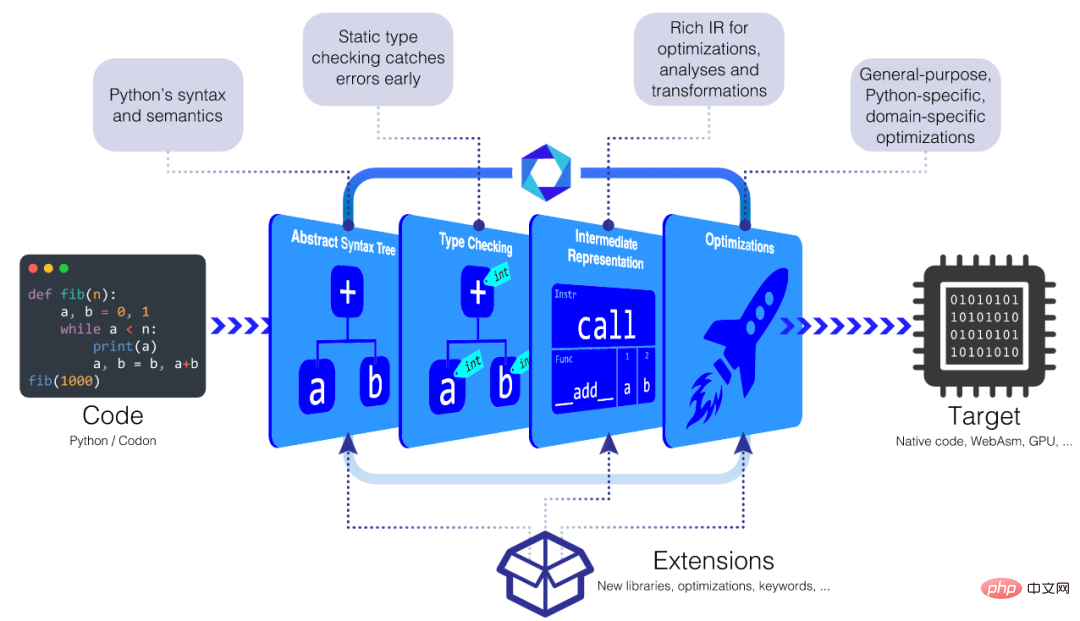 Codon Pipeline
Codon Pipeline
What is the effect of this compiler that has been so popular since its release? Let's take a look at some benchmark results.
BenchmarksThe following are results from the Codon benchmark suite, comparing the performance of Python, PyPy, C, and Codon on a range of tasks and applications.
Benchmarks were run on the following settings:


##Comparison of Python, PyPy, and Codon
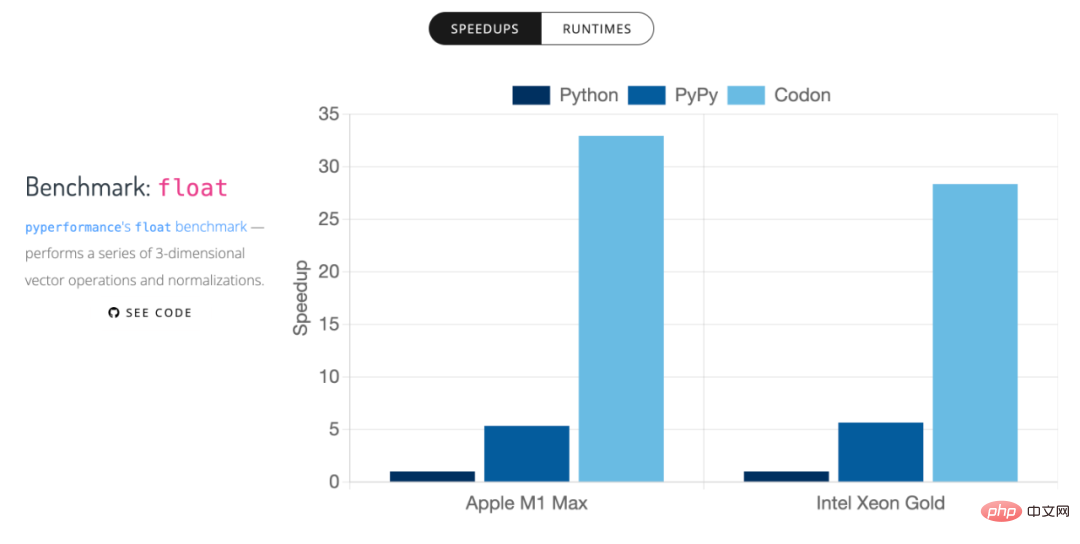
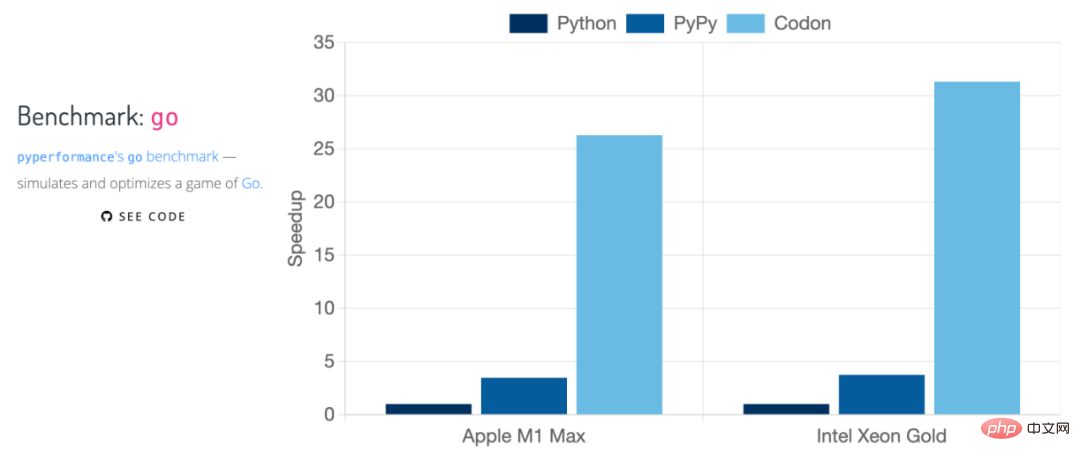
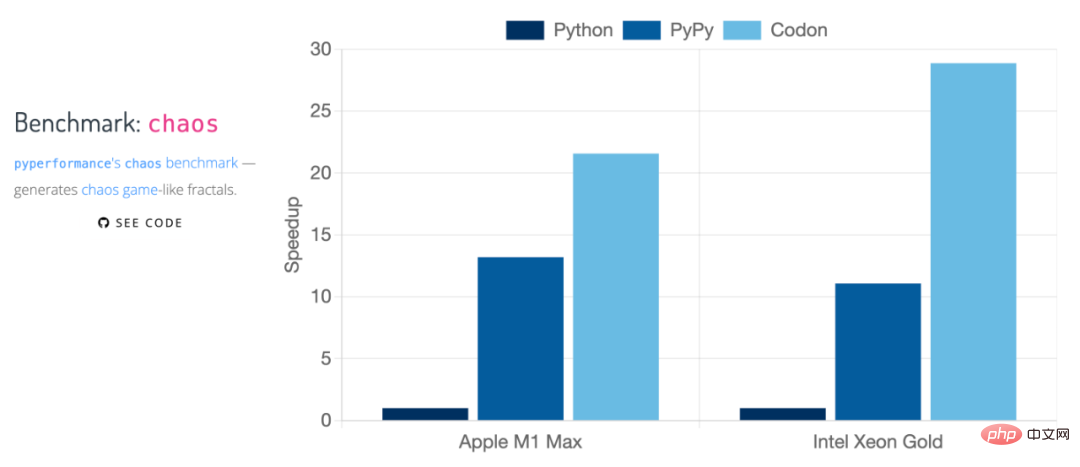
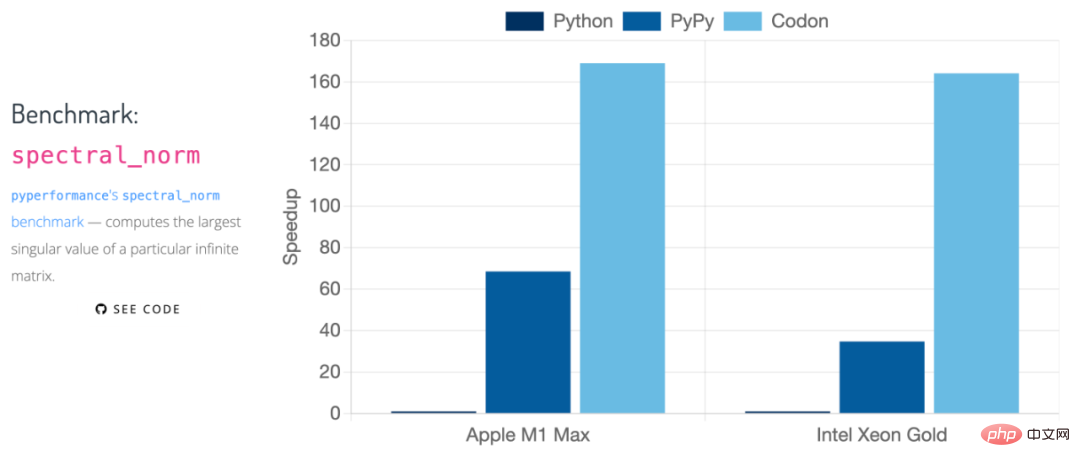
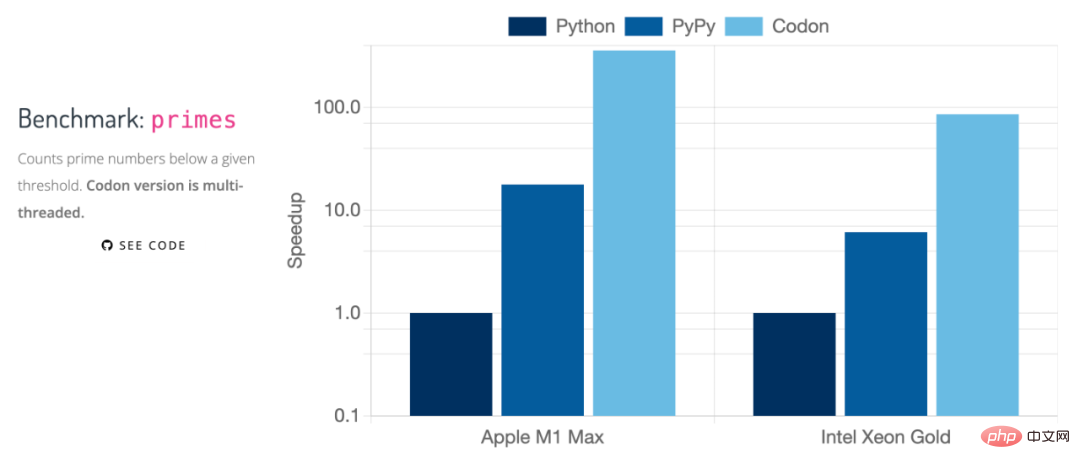
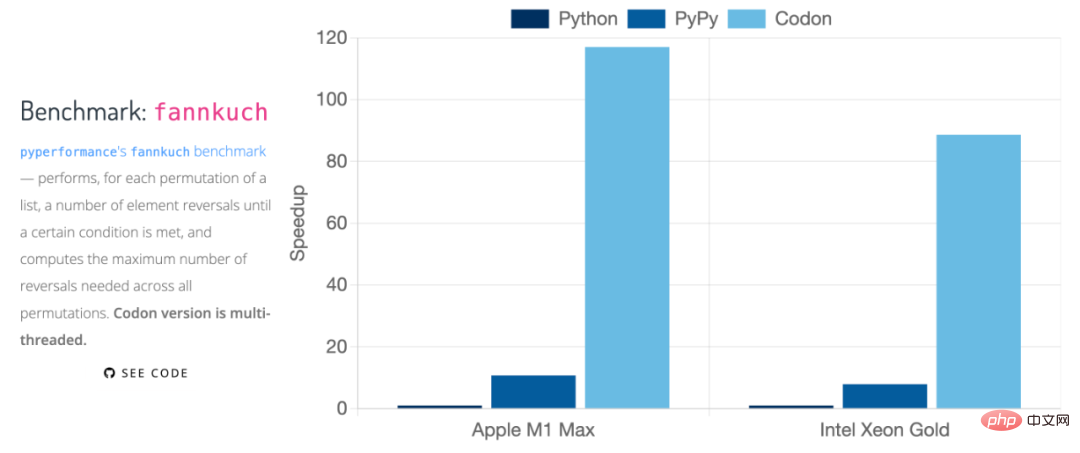
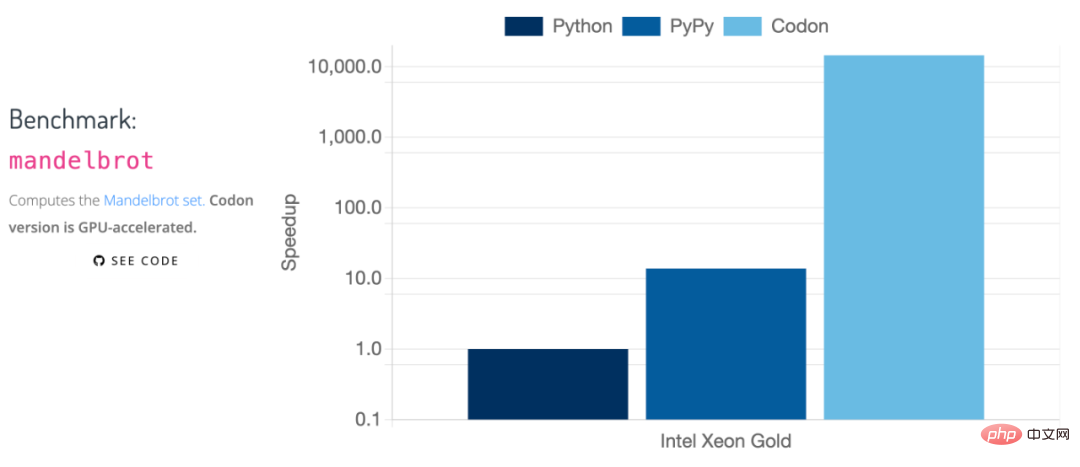
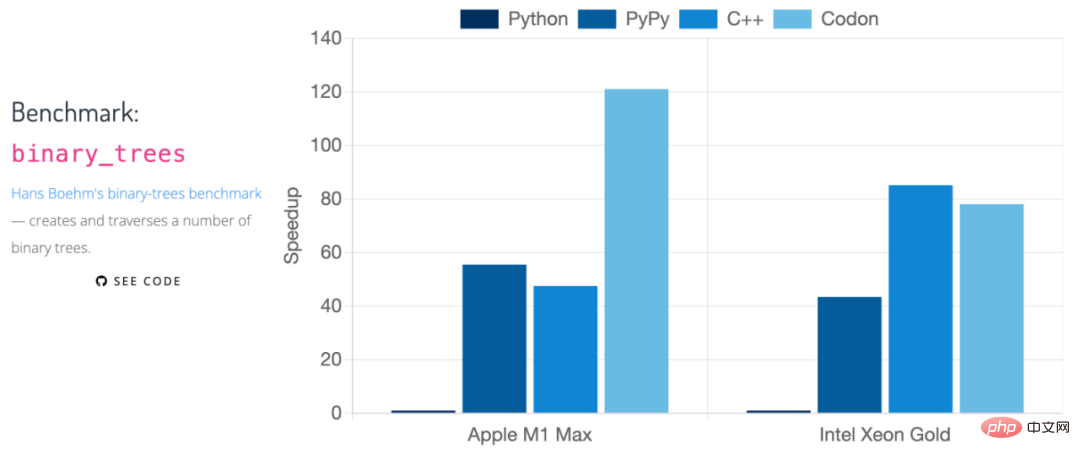
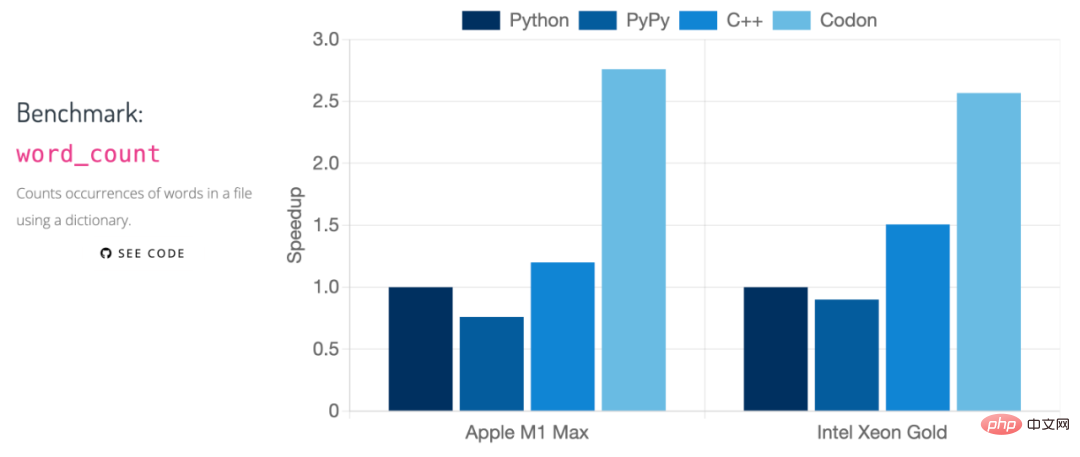
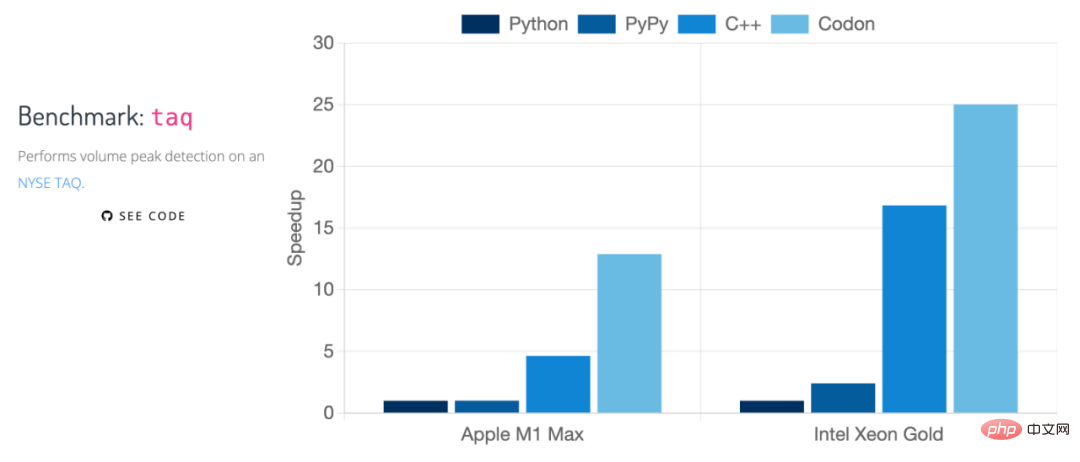
##The specific comparison of several languages is as follows:
Codon follows CPython syntax, semantics and API as much as possible, but in some special cases, considering performance reasons, Codon will be somewhat different from CPython. For example, Codon is a 64-bit int, and CPython is arbitrary widthint. In terms of performance, CPython speedups are typically 10-100x speedups.
Although Codon does provide a JIT decorator similar to Numba, Codon is generally an ahead-of-time compiler that can compile end-to-end programs into Native code. It also supports compilation of a wider set of Python constructs and libraries.
PyPy aims to be a simple replacement for CPython, while Codon is different in some places. These differences are mainly reflected in the elimination of dynamic runtime or virtual machine, resulting in better performance.
Codon usually generates the same code as an equivalent C or C program, and can sometimes generate better code than a C/C compiler. There are many reasons, such as better container implementation, Codon not using object files and inlining all library code, or Codon-specific compiler optimizations that are not performed using C or C .
Codon's compilation process is actually closer to C than to Julia. Julia is a dynamically typed language that performs type inference as an optimization, whereas Codon types are checked ahead of time throughout the program. Codon also attempts to circumvent the learning curve of a new language by adopting Python's syntax and semantics.
FAQAlthough Codon supports almost all syntax of Python, it is not a simple replacement, and large code bases may require modifications to compile with Codon The server is running. For example, some Python modules have not been implemented in Codon, and some dynamic features of Python are not allowed. The Codon compiler generates detailed error messages to help identify and resolve any incompatibility issues. Codon supports seamless Python interoperability to handle situations that require specific Python libraries or dynamics.
I want to use Codon, but I have a large Python code base and don’t want to port it, what should I do?
You can use Codon through the @codon.jit decorator, which will only compile annotated functions and automatically handle data conversion to and from Codon. It also allows the use of any Codon-specific modules or extensions, such as multithreading.
How interoperable is it with other languages and frameworks?
Interoperability is a priority at Codon. We don't want to use Codon to prevent users from using other great frameworks and libraries that exist. Codon supports full interoperability with Python and C/C.
Does Codon use garbage collection?
Yes, Codon uses the Boehm garbage collector.
Codon doesn't support Python module X or function Y?
While Codon covers a sizeable subset of the Python standard library, it does not yet cover every function in every module. Note that missing functions can still be called from Python import. Many functions that lack native implementations of Codon (such as I/O or OS-related functions) typically do not achieve substantial speedups from Codon.
Is Codon not faster than Python for my application?
Applications that spend most of their time in library code implemented in C will generally not see substantial performance improvements in Codon. Likewise, applications that are I/O or network bound will experience the same bottlenecks in Codon.
Is Codon slower than Python for my application?
If this is the case, please report Codon being significantly slower than Python to the issue tracker.
Is Codon free?
Codon is always free for non-production use. Users are free to use Codon for personal, academic, or other non-commercial applications.
Is Codon open source?
Codon is licensed under the Business Source License (BSL) and its source code is publicly available and free for non-production use. BSL is not technically an "open source" license, although in many cases you can still treat Codon like any other open source project. Importantly, according to the BSL, every version of Codon is transitioned to an actual open source license (specifically Apache) after 3 years.
The above is the detailed content of Earning 2,000 stars, the speed is increased by a hundred times, and the high-performance Python compiler Codon is open source. For more information, please follow other related articles on the PHP Chinese website!

Hot AI Tools

Undresser.AI Undress
AI-powered app for creating realistic nude photos

AI Clothes Remover
Online AI tool for removing clothes from photos.

Undress AI Tool
Undress images for free

Clothoff.io
AI clothes remover

AI Hentai Generator
Generate AI Hentai for free.

Hot Article

Hot Tools

Notepad++7.3.1
Easy-to-use and free code editor

SublimeText3 Chinese version
Chinese version, very easy to use

Zend Studio 13.0.1
Powerful PHP integrated development environment

Dreamweaver CS6
Visual web development tools

SublimeText3 Mac version
God-level code editing software (SublimeText3)

Hot Topics
 1377
1377
 52
52
 Do mysql need to pay
Apr 08, 2025 pm 05:36 PM
Do mysql need to pay
Apr 08, 2025 pm 05:36 PM
MySQL has a free community version and a paid enterprise version. The community version can be used and modified for free, but the support is limited and is suitable for applications with low stability requirements and strong technical capabilities. The Enterprise Edition provides comprehensive commercial support for applications that require a stable, reliable, high-performance database and willing to pay for support. Factors considered when choosing a version include application criticality, budgeting, and technical skills. There is no perfect option, only the most suitable option, and you need to choose carefully according to the specific situation.
 How to use mysql after installation
Apr 08, 2025 am 11:48 AM
How to use mysql after installation
Apr 08, 2025 am 11:48 AM
The article introduces the operation of MySQL database. First, you need to install a MySQL client, such as MySQLWorkbench or command line client. 1. Use the mysql-uroot-p command to connect to the server and log in with the root account password; 2. Use CREATEDATABASE to create a database, and USE select a database; 3. Use CREATETABLE to create a table, define fields and data types; 4. Use INSERTINTO to insert data, query data, update data by UPDATE, and delete data by DELETE. Only by mastering these steps, learning to deal with common problems and optimizing database performance can you use MySQL efficiently.
 How to optimize MySQL performance for high-load applications?
Apr 08, 2025 pm 06:03 PM
How to optimize MySQL performance for high-load applications?
Apr 08, 2025 pm 06:03 PM
MySQL database performance optimization guide In resource-intensive applications, MySQL database plays a crucial role and is responsible for managing massive transactions. However, as the scale of application expands, database performance bottlenecks often become a constraint. This article will explore a series of effective MySQL performance optimization strategies to ensure that your application remains efficient and responsive under high loads. We will combine actual cases to explain in-depth key technologies such as indexing, query optimization, database design and caching. 1. Database architecture design and optimized database architecture is the cornerstone of MySQL performance optimization. Here are some core principles: Selecting the right data type and selecting the smallest data type that meets the needs can not only save storage space, but also improve data processing speed.
 HadiDB: A lightweight, horizontally scalable database in Python
Apr 08, 2025 pm 06:12 PM
HadiDB: A lightweight, horizontally scalable database in Python
Apr 08, 2025 pm 06:12 PM
HadiDB: A lightweight, high-level scalable Python database HadiDB (hadidb) is a lightweight database written in Python, with a high level of scalability. Install HadiDB using pip installation: pipinstallhadidb User Management Create user: createuser() method to create a new user. The authentication() method authenticates the user's identity. fromhadidb.operationimportuseruser_obj=user("admin","admin")user_obj.
 Navicat's method to view MongoDB database password
Apr 08, 2025 pm 09:39 PM
Navicat's method to view MongoDB database password
Apr 08, 2025 pm 09:39 PM
It is impossible to view MongoDB password directly through Navicat because it is stored as hash values. How to retrieve lost passwords: 1. Reset passwords; 2. Check configuration files (may contain hash values); 3. Check codes (may hardcode passwords).
 Does mysql need the internet
Apr 08, 2025 pm 02:18 PM
Does mysql need the internet
Apr 08, 2025 pm 02:18 PM
MySQL can run without network connections for basic data storage and management. However, network connection is required for interaction with other systems, remote access, or using advanced features such as replication and clustering. Additionally, security measures (such as firewalls), performance optimization (choose the right network connection), and data backup are critical to connecting to the Internet.
 Can mysql workbench connect to mariadb
Apr 08, 2025 pm 02:33 PM
Can mysql workbench connect to mariadb
Apr 08, 2025 pm 02:33 PM
MySQL Workbench can connect to MariaDB, provided that the configuration is correct. First select "MariaDB" as the connector type. In the connection configuration, set HOST, PORT, USER, PASSWORD, and DATABASE correctly. When testing the connection, check that the MariaDB service is started, whether the username and password are correct, whether the port number is correct, whether the firewall allows connections, and whether the database exists. In advanced usage, use connection pooling technology to optimize performance. Common errors include insufficient permissions, network connection problems, etc. When debugging errors, carefully analyze error information and use debugging tools. Optimizing network configuration can improve performance
 Does mysql need a server
Apr 08, 2025 pm 02:12 PM
Does mysql need a server
Apr 08, 2025 pm 02:12 PM
For production environments, a server is usually required to run MySQL, for reasons including performance, reliability, security, and scalability. Servers usually have more powerful hardware, redundant configurations and stricter security measures. For small, low-load applications, MySQL can be run on local machines, but resource consumption, security risks and maintenance costs need to be carefully considered. For greater reliability and security, MySQL should be deployed on cloud or other servers. Choosing the appropriate server configuration requires evaluation based on application load and data volume.



